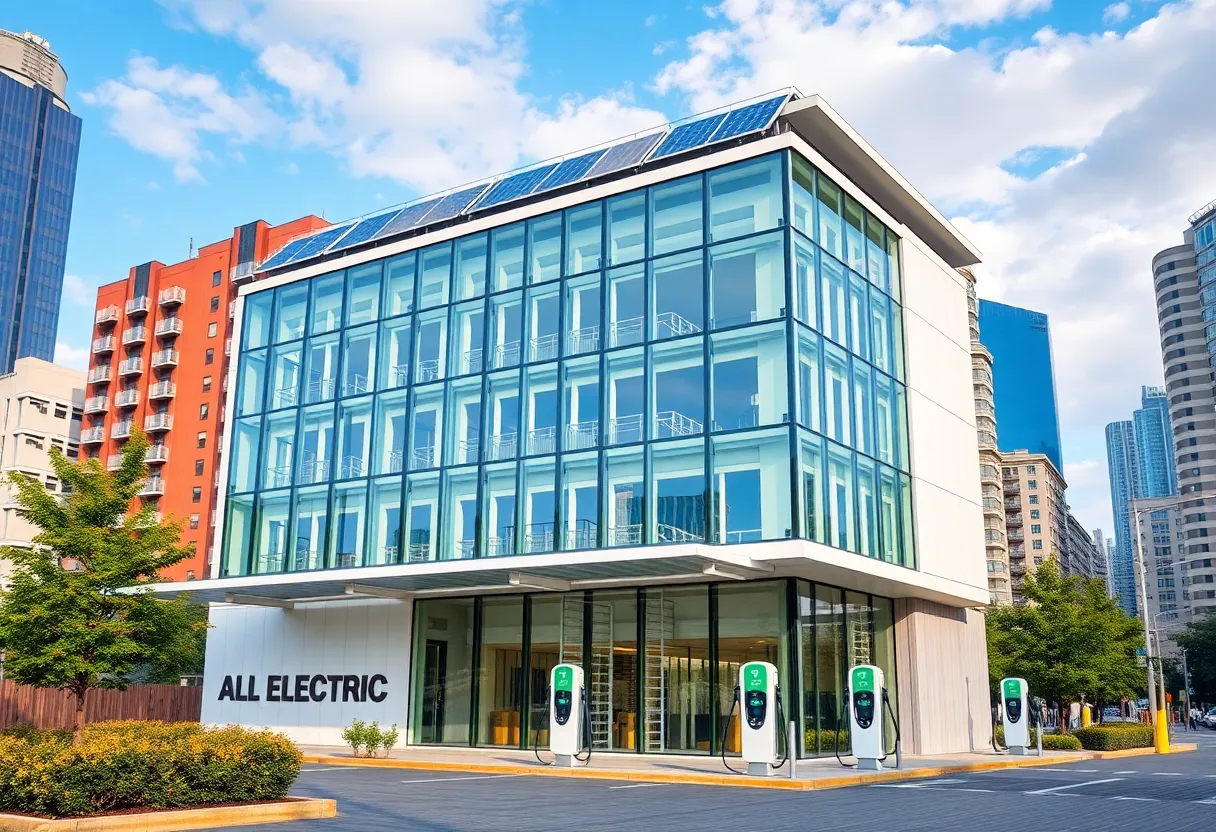News Summary
New York State will implement new regulations in 2026 requiring all new buildings to use all-electric heating and appliances. This initiative aims to phase out fossil fuels and reduce greenhouse gas emissions as part of the state’s climate action policy. While there are exemptions for existing buildings and certain new constructions, concerns about rising housing costs and infrastructure challenges persist. Stakeholders are preparing for the complexities of this transition while striving to align with the state’s sustainability goals.
New York State will implement new building and construction regulations starting January 2026, requiring all new buildings to transition away from fossil fuels as part of its climate action policy. This initiative is a direct result of the 2019 Climate Leadership and Community Protection Act, which aims to reduce greenhouse gas emissions and promote renewable energy across the state.
Under the new regulations, all new constructions, including homes under seven stories, will need to be equipped with all-electric heating and appliances. A recent Zoom meeting attended by New York City area lawmakers and environmental advocates celebrated this significant move by the New York State Fire Prevention and Building Codes Council, highlighting the growing recognition of the importance of sustainable building practices.
Key legislators, such as NYS Assemblymember Emily Gallagher from Brooklyn, expressed pride in the new All Electric Building Act. State Senator Liz Kruger from Manhattan noted that the requirements may eventually extend to all buildings, indicating a broader commitment to phasing out fossil fuels in construction. This approach aligns with the state’s Scoping Plan, which calls for the replacement of gas appliances with electric heat pumps and devices as they reach the end of their lifecycle.
Existing buildings, however, will be exempt from the new all-electric requirements, even during renovations. Certain new constructions, including restaurants, hospitals, factories, and agricultural buildings, will also be excluded from these regulations, allowing for flexibility within the industry. This exemption has raised concerns among members of the Buffalo Niagara Builders Association, who anticipate an increase in housing costs by approximately $20,000 per home due to these new mandates.
Although the transition to all-electric buildings aligns with the state’s climate goals, there is a significant dependency on fossil fuels for the electrical supply required to support this policy. This reliance complicates the state’s overall climate objectives and adds an extra layer of complexity to the upcoming changes. Rising utility bills in New York have further stoked criticism, with opponents pointing out that these costs are partly the result of transitioning to renewable energy sources and necessary infrastructure improvements.
Governor Kathy Hochul acknowledged the challenges posed by the new regulations and emphasized the importance of careful implementation to prevent undue burden on ratepayers. Recently, a federal lawsuit seeking to block the all-electric requirement was dismissed, reaffirming the state’s commitment to its climate action goals.
The slow legislative process, particularly concerning the updating of building codes to reflect new laws, has drawn criticism from various stakeholders. The building code is traditionally updated every five years, with the most recent edition dating back to November 2019. Consequently, this delay may cause challenges for home builders who are currently in the midst of ongoing projects, further complicating the transition to all-electric construction.
Despite the concerns, a prior study suggested that building all-electric homes could be less expensive than constructing mixed-fuel properties. Additionally, existing mandates for all-electric requirements in New York City have reportedly been implemented effectively, with no significant issues arising.
The state continues to face a critical juncture as it seeks to maintain its climate action objectives while ensuring the seamless implementation of the all-electric building policy. The push for timely execution aims to prevent delays that could hinder New York’s progress toward a more sustainable future. As January 2026 approaches, stakeholders will need to navigate the complexities of this transition while addressing the associated challenges of cost, infrastructure, and energy supply.
Deeper Dive: News & Info About This Topic
- WGRZ: NYS Law Forces All Electric for Most New Building Construction
- WGRZ: Hochul Concerns Over All Electric Buildings Act
- The Electric: Business Bites – 100 Acre Mixed-Use Project Proposed
- Buffalo News: Column on Local Development
- Buffalo Rising: 37th Annual City of Buffalo New Year’s Eve Ball Drop
- Wikipedia: Building Codes
- Google Search: All Electric Buildings New York
- Google Scholar: Sustainable Building Practices
- Encyclopedia Britannica: Green Building
- Google News: New York Construction Regulations

Author: STAFF HERE NEW YORK WRITER
The NEW YORK STAFF WRITER represents the experienced team at HERENewYork.com, your go-to source for actionable local news and information in New York, the five boroughs, and beyond. Specializing in "news you can use," we cover essential topics like product reviews for personal and business needs, local business directories, politics, real estate trends, neighborhood insights, and state news affecting the area—with deep expertise drawn from years of dedicated reporting and strong community input, including local press releases and business updates. We deliver top reporting on high-value events such as New York Fashion Week, Macy's Thanksgiving Day Parade, and Tribeca Film Festival. Our coverage extends to key organizations like the Greater New York Chamber of Commerce and United Way of New York, plus leading businesses in finance and media that power the local economy such as JPMorgan Chase, Goldman Sachs, and Bloomberg. As part of the broader HERE network, including HEREBuffalo.com, we provide comprehensive, credible insights into New York's dynamic landscape.





